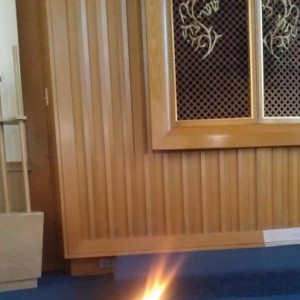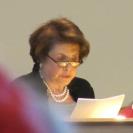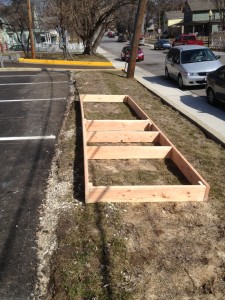You are what you eat. Yesterday at Weight Watchers we discussed a scenario where Joe wolfed down two donuts at the morning staff meeting. We talk about people pigging out You may remember the oft quoted poem:
I never saw a Purple Cow
I never hope to see one;
But I can tell you, anyhow,
I’d rather see than be one.[1
I once walked out of a restaurant when Sarah was an infant because I thought my mother had implied I was a purple cow.
I can tell you this. According to the laws we are about to read, I could have eaten a purple cow. Eating cow is OK. Yes, this morning we are about to read the laws of kashrut, about keeping kosher. What does kosher mean? The group answered clean, fit, a way that Jews eat.
Although lots of people say that it means clean, it really does not. It’s real meaning is fit, proper or appropriate.
Why do we keep kosher? The group answered, to keep us distinct, because G-d said so, because the animals are cleaner, because that is the way it has always been done.
When I was in seventh grade religious school we were a class from hell (apparently). The parents stepped in and started teaching instead of whoever couldn’t control the class. My mother’s assignment was to teach a mini-course about kashrut. Pretty funny for the classical Reform Jew. She brought in the rabbi to do the first lesson. He started by saying that kashrut is an outmoded form of Judasim and that no body kept it any more. Then we went to the old kosher deli in town and learned about red soap and blue soap. I didn’t know any body who kept kosher until I went to college.
In college I wanted to cook. Hillel had a kosher kitchen. I learned the rules. After that first batch of horrible brownies, I threw out the flavor packet thinking it wasn’t kosher, I went on to manage the Hillel kitchen and I won the Kosher Gourmet Cooking Contest. I became kosher. I bought new dishes. I marked them with nail polish on the back so that I had two meat dishes and two milk dishes. We still have them. My reason was so that any one of my friends would be comfortable eating in my house—my dorm room. For me that was reason enough. It was about community. I still do that. I am stringent about what we can and cannot do in the synagogue kitchen so that anyone will feel comfortable eating here.
In rabbinical school I took a class called ta’amei hamitzvot, the reasons behind the commandments. The rabbis argue about whether one should try to find a reason behind the commandments or not. If G-d said it, you do it. Period. You don’t need a reason. But of course they continue…
Some rabbis believe that it is about keeping Jews separate from the main society. If you have all these rules it is difficult to be social with your neighbors. In fact they say this about many of the most observed commandments, Shabbat, mezuzah, circumcision, kashrut, all designed to keep us apart, separate, unique. It is an interesting anthropological theory. But I am not sure that is what we want in 21st century America, to be kept separate.
Some people believe that eating bottom feeders or pork was dangerous. It wasn’t healthy. The animals might be carrying some very deadly disease like trichinosis. Some thought that it was a polemic against the surrounding cultures who may have worshipped a pig, for example. But those ideas seem less of issues today. So was the rabbi in Grand Rapids right? It is an outmoded form of Judaism.
I don’t think so. The answer for me lies in the last few verses of the parsha, Verse 44 says, “For I the Lord am your G-d. You shall sanctify yourselves and be holy, for I am holy. You shall not make yourselves impure…”
We are taught we are to be like G-d, not like the animals. So when my Weight Watchers meeting talked about wolfing down a donut, that is probably not kosher. When we pig out, that is not kosher. We are to eat like human beings. We are to sanctify our food and give thanks to G-d. We are told when we have eaten and are satisfied we should praise G-d. So for me, kashrut is a reminder of G-d. It slows me down just enough to be intentional about my eating. Oops, can’t eat that bacon cheeseburger, even if the picture looks good and smell coming from the kitchen seems divine and makes me salivate.
This week in the counting of the omer is about gevurah, discipline. Today is netzach b’gevurah, everlasting discipline. Gevurah comes from the same root as giibor, to be strong, like we read in the Amidah, “Ata Gibor”. For me observing kashrut is a discipline and one I always need to work on. It requires strength and will power. But its reward is bringing me closer to G-d. As a spiritual discipline, It is no longer an outmoded form of Judaism.
It surprised me when looking at this week’s reading how little commentary there is in Eitz Chayyim. One part actually made me chuckle. Although we are only told that we should not eat pork in the Torah twice, every Jew knows this. Eitz Chayyim contrasted that with the fact that 36 times it tells us to take care of the widow, the orphan and the stranger. True, but does every Jew know we don’t eat pork?
We Jews have made kashrut much more complex than the Torah portion itself. How do you separate meat from milk? How long do you wait? 6 hours, 3 hours or 1 hour like the Dutch. Why is chicken which never gives milk considered meat? You can never boil a chicken in its mother’s milk. Why do we need two sets of dishes and then some? The Conservative Movement has ruled that bone china cannot absorb the meat juices in the ways that earthen ware can. Why do we need a hecksher on cheese or wine? Is asparagus really not kosher? All of these issues are about putting a fence around the Torah, so that there is no chance we will break a Toraitic law. There are some groups within Judaism that are getting stricter and stricter without going back to the original intention of being holy, for fear of making a mistake outweighs being holy. We might displease G-d.
When my daughter was eight, she got very frustrated with one of our rabbis. She said that the problem with him was he just put people into little boxes. Are you kosher or are you not? If you are kosher, how kosher are you? He made keeping kosher difficult, a real challenge. It wasn’t fun. We changed synagogues. I want her to grow up with a love of Judaism, a love of G-d and a love of keeping kosher. Now she can be stringent in her own right—just ask me about Passover ketchup. She will tell you it is because that is the way I raised her and even though there is no good halachic explanation, we better not skip the Passover ketchup. Period.
If keeping kosher is about being fit or proper and remembering to be holy because G-d is holy, then there are some modern issues worth considering about kashrut.
Rabbi Dahlia Marx asks these questions:
• Can fast food that’s saturated with cholesterol be kosher?
• Is food that’s manufactured by children in Third World countries kosher?
• Is the flesh of animals raised in unimaginably bad conditions and cruelly slaughtered considered to be kosher? We don’t eat any veal in our house for example.
• Are TV dinners that are heated and served without care to children who stare impassively at screens kosher?
Can food eaten with anger and shame to compensate for all that is missing in life be kosher?
I would add some additional questions:
• Should we be using fair trade coffee and chocolate, even though it can be more expensive? I particularly like a coffee called Delicious Peace. It is kosher, fair trade and organic certified and made by a collaborative of Jews, Christians and Muslims in Uganda.
• Is organic food really better or should we be using locally sourced food—I am a big fan of the Elgin Farmer’s Market but what do we do in the winter?
• If some organic food companies keep their workers in a state of modern slavery should we be buying organic food at all? Some people including Truah, formerly Rabbis for Human Rights are boycotting some tomatos from Florida. Is this a modern kashrut issue?
• What about kosher meat? Is kosher slaughter really kinder to the animal? What about kosher meat plant workers? Are they treated ethically? There have been numerous issues lately.
• Should we take a share in a CSA to support local farmers? What about the new local food co-op I heard about last night. Should we consider a share in that?
• Using disposable dishes may make it easier to keep halachic kashrut, but it is bad for the environment. Styrofoam is the worst. But hiring someone to wash dishes may not be halachic either. Do we have the energy and wherewithal to wash our own.
When people ask me how to start keeping kosher, I explain, there are plenty of ways to keep kosher. It is not like pregnancy where you can’t be a little bit pregnant. It is more like a spectrum, or differing levels. You can keep Biblical Kashrut. Follow the rules that we will read this morning. You can observe rabbinic Kashrut. You can be a vegetarian and avoid the whole question of separation of meat and milk. You can practice eco-Kashrut and avoid the things that are a danger to the earth. You can use locally sourced food. People have been known to be kosher at home at what ever level and not out.
Ultimately, for me I think kashrut is about drawing closer to G-d and remembering to live intentionally. I don’t want to be a wolf, a pig or a purple cow. I want to be like G-d, holy. Join me.



